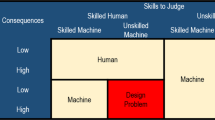Abstract
The transformation of family systems is influenced by various complex factors. Compared to economic, cultural, social and other influencing factors, AI(Artificial Intelligence) has a special impact on the transformation of family systems. Based on Complex Adaptive System (CAS) theory, this paper analyzes the mechanisms of AI impacting on the transformation of family systems. CAS theory emphasizes the complexity, adaptability, and nonlinear evolution of phenomena or entities. Within the framework of CAS theory, the transformation of family systems is also regarded as a complex adaptive system, characterized by adaptability and nonlinear dynamics. Through real-time data collection, precise data analysis, and personalized feedback generation, AI enables family systems to develop effective adaptation and feedback mechanisms in response to environmental changes and internal demand adjustments. These adaptation and feedback mechanisms drive the optimization of family decision-making patterns and the restructuring of key elements within the family systems, ultimately influencing transformation of family systems.
Access this chapter
Tax calculation will be finalised at checkout
Purchases are for personal use only
Similar content being viewed by others
References
Thomas, P.A. , Liu, H. , Umberson, D. : Family Relationships and Well-Being. Innovation in Aging 1(3), igx025 (2017)
Hertlein, K.M.: Digital dwelling: technology in couple and family relationships. Fam. Relat. 61(3), 374–387 (2012)
Guo, Y.: Examining the impact of assistive technology on psychological health, family education, and curriculum research in Japan: Insights from Artificial Intelligence. J. Autism Dev. Disord. (2023). https://doi.org/10.1007/s10803-023-06105-4
Zhao, J., Wu, M., Yun, L., Wang, X., Jia, J.: Cognitive psychology-based artificial intelligence review. Frontiers in Neuroscience (2022). https://doi.org/10.3389/fnins.2022.1024316
Brynjolfsson, E. , McAfee, A.: Artificial intelligence, for real. Harvard Business Review (2017). https://starlab-alliance.com/wp-content/uploads/2017/09/AI-Article.pdf
Holland, J.H.: Studying complex adaptive systems. J. Syst. Sci. Complexity 19(1), 1–8 (2006)
Ogburn, W.F.: Social Change with Respect to Culture and Original Nature, pp. 237–256. B. W. HUEBSCH Press, New York (1922)
Bengtson, V.L.: Beyond the nuclear family: the increasing importance of multigenerational bonds. J. Marriage Fam. 63(1), 1–16 (2001)
Paragas, F. de la C., Lin, T.T.C.: Organizing and reframing technological determinism. New Media Soc. 18(8), 1528–1546 (2014)
Calo, R.: Robots and privacy. In: Lin, P., Abney, K., Bekey, G.A. (eds.) Robot Ethics: The Ethical and Social Implications of Robotics, pp. 187–201. MIT Press, Cambridge (2012)
Hu, S.: The ethical limits and philosophical reflections on family support provided by Artificial Intelligence. J. Northeastern Univ. (Soc. Sci. Ed.) 26(03), 145–152 (2024)
Ahmed, B.: The dynamics of family structures in modern society: shifting patterns and evolving definitions. Liberal J. Lang. Literat. Rev. 2(1), 57–68 (2024)
Zhang, S., Ma, B.: Home redefined: concerns about the impact of humanoid intelligence on human family relationships. Media Watch 16(06), 201–209 (2021)
Acknowledgements
This research was supported by Research on the Innovation of Teaching Paradigm and Practical Exploration of Ideological and Political Theory Courses in Institutes Based on Large Language Model (No. 2023GXSZ169) and Research on the Improvement Strategy of Teaching Effects of Ideological and Political Theory Courses in Institutes Based on Large Language Model (No. Szjy23012).
Author information
Authors and Affiliations
Corresponding author
Editor information
Editors and Affiliations
Rights and permissions
Copyright information
© 2025 The Author(s), under exclusive license to Springer Nature Switzerland AG
About this paper
Cite this paper
Yu, J., Ma, H., Li, Y. (2025). The Mechanisms of Artificial Intelligence Impacting on the Transformation of Family Systems: A Perspective of Complex Adaptive Systems Theory. In: Zeng, J., Zhang, LJ. (eds) Edge Computing – EDGE 2024. EDGE 2024. Lecture Notes in Computer Science, vol 15424. Springer, Cham. https://doi.org/10.1007/978-3-031-77069-2_5
Download citation
DOI: https://doi.org/10.1007/978-3-031-77069-2_5
Published:
Publisher Name: Springer, Cham
Print ISBN: 978-3-031-77068-5
Online ISBN: 978-3-031-77069-2
eBook Packages: Computer ScienceComputer Science (R0)




